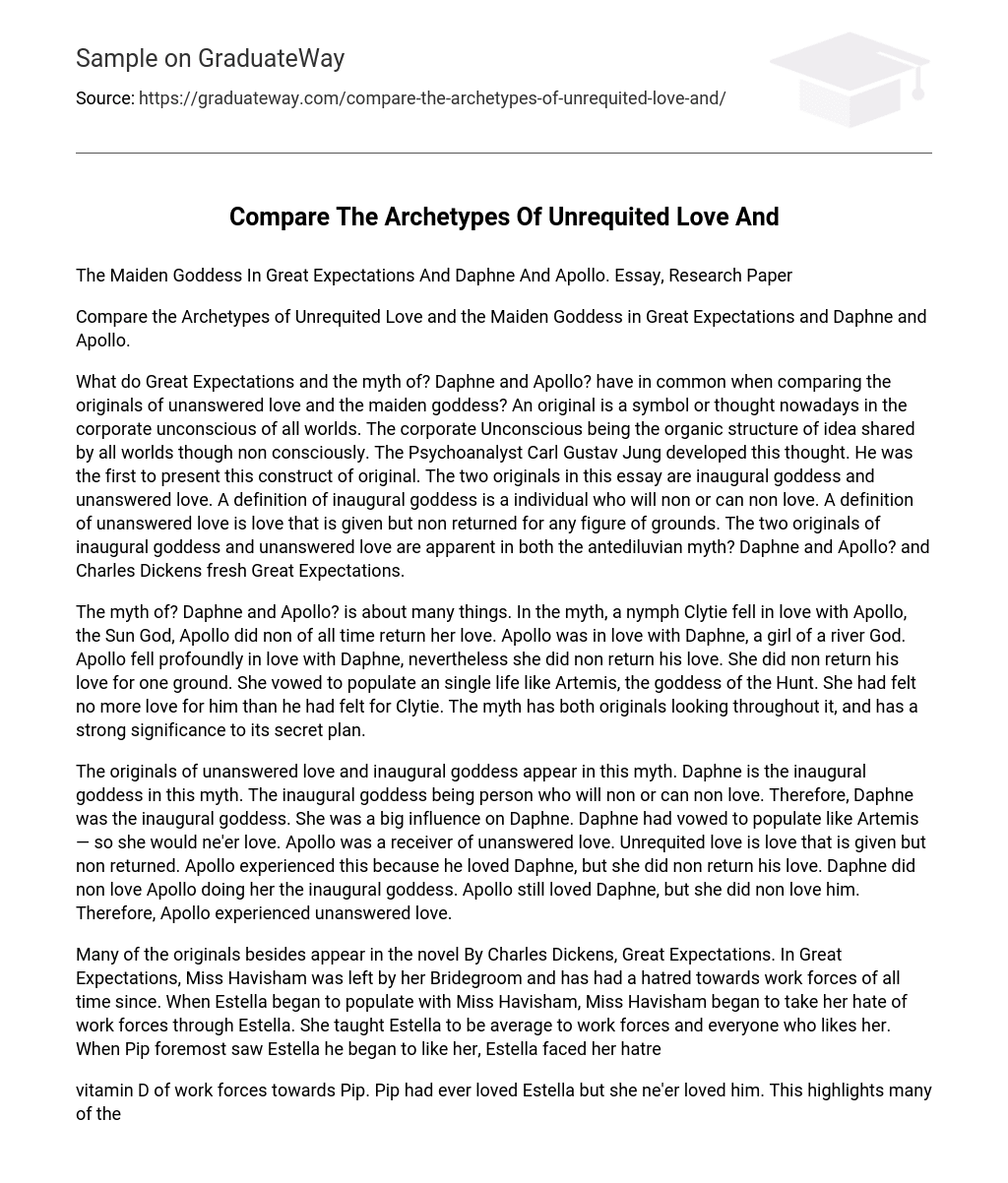The topic of comparison in this essay is the depiction of the maiden goddess in Great Expectations and Daphne and Apollo.
In both Great Expectations and Daphne and Apollo, the archetypes of Unrequited Love and the Maiden Goddess are compared.
When comparing the originals of unanswered love and the maiden goddess, Great Expectations and the myth of Daphne and Apollo share a commonality. The corporate unconscious exists as a symbol or thought within all worlds. This concept was introduced by Carl Gustav Jung, a psychoanalyst who defined the original. In this essay, we discuss two originals: the maiden goddess and unanswered love. The maiden goddess is someone incapable or unwilling to love, while unanswered love refers to unreciprocated affection for various reasons. Both Charles Dickens’ novel Great Expectations and the myth of Daphne and Apollo exemplify these two originals.
The story of Daphne and Apollo encompasses various themes. In the tale, Clytie, a nymph, developed feelings for Apollo, the Sun God, but he never reciprocated her affection. Instead, Apollo was infatuated with Daphne, the daughter of a river god. Although Apollo deeply loved Daphne, she did not love him in return. The reason behind her lack of affection was her vow to live a solitary existence akin to Artemis, the goddess of the Hunt. Daphne’s feelings towards Apollo were no different from his feelings towards Clytie. This myth prominently features both characters and holds great significance to its plot.
In this myth, the concept of unanswered love and the inaugural goddess are intertwined. The story revolves around Daphne, who is depicted as the specific inaugural goddess unable or unwilling to experience love. She had made a promise to live like Artemis and never fall in love. Meanwhile, Apollo is portrayed as the recipient of unrequited love, which means his feelings for Daphne are not returned. Despite Apollo’s persistent affection for her, Daphne becomes the inaugural goddess by rejecting his love. Hence, Apollo goes through a state of unanswered love.
The characters from Charles Dickens’ novel, Great Expectations, also exist in the original text. In the book, Miss Havisham faced abandonment by her Bridegroom and has held a strong resentment towards men ever since. Under Miss Havisham’s guidance, Estella is taught to be cruel to men and anyone who displays affection towards her. Despite Estella’s natural hostility towards him, Pip develops feelings for her upon their initial meeting.
The essay highlights the significance of vitamin D for Pip’s character development. Throughout Great Expectations, Pip harbored deep feelings for Estella, although she never reciprocated his love. This parallels the key themes explored in the myth of Daphne and Apollo.
The original themes of Maiden Goddess and Unrequited love are present in Great Expectations. Estella is portrayed as a maiden goddess because she is incapable of love. Miss Havisham’s anger towards men has influenced Estella’s beliefs and behavior, causing her to become devoid of love. Estella’s lack of affection prevents her from ever falling in love with Pip. Pip, on the other hand, experiences unrequited love for Estella. Unrequited love is when love is given but not reciprocated for various reasons. From the moment Pip lays eyes on Estella, he develops feelings for her that are never reciprocated. This unreturned love is also referred to as unanswered love. Throughout the story, Pip maintains his love for Estella, despite her never returning his affections. The themes of Maiden Goddess and Unrequited love are subtly woven throughout Great Expectations.
The myth of Daphne and Apollo shares many similarities with the story of Great Expectations, particularly in their portrayal of unrequited love. Both Daphne and Estella were unable to reciprocate the love they received from their respective admirers, influenced by others who shaped their inability to love. They became the object of unrequited love, both Apollos and Pips, as they did not receive any love in return. Daphne and Estella can be seen as the embodiments of the unattainable goddess. Estella and Daphne were individuals who were incapable of love, which is partly why Apollo yearned for Daphne and Pip longed for Estella, leading to their unanswered love.
The myth of Daphne and Apollo revolves around the theme of an inaugural goddess and unanswered love. Daphne, the inaugural goddess in this myth, becomes the subject of Apollo’s unrequited love. Similarly, in Great Expectations, Estella takes on the role of the inaugural goddess, while Pip pines after her without his love being returned. These two narratives both feature these recurring themes. Throughout history, these archetypes have been observed in society for centuries. However, if individuals were to become less susceptible to their influence and less emotionally vulnerable, these archetypes would cease to exist.
Brett Skyllingstad





